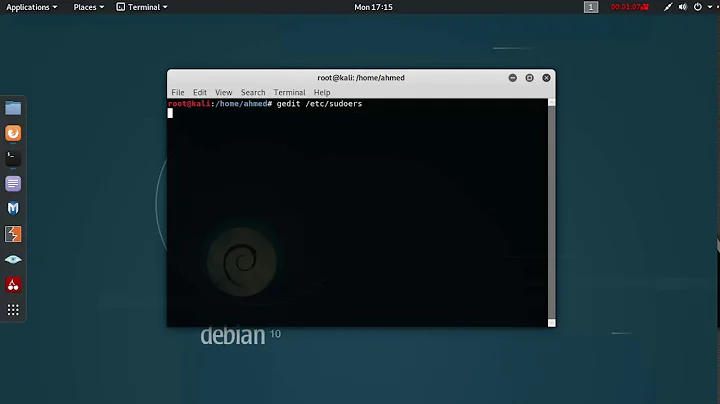Why can you not sudo history?
Solution 1
history is a bash shell builtin command, and sudo doesn't work with shell builtins.
What's a builtin command and what's not?
I used the command which that "returns the pathnames of the files (or links) which would be executed in the environment" to confirm that history was not an external (to bash) command.
For example, running
$ which history
$
returns nothing and the exit code is 1 (one or more specified commands is nonexistent or not executable) [FYI see the exit code with echo $?], while running
$ which ls
/bin/ls
$
and the exit code 0 (all specified commands are found and executable).
Also, in bash you can look up help for builtin commands with help (or searching the man bash page). For example, typing
$ help history
history: history [-c] [-d offset] [n] or history -anrw [filename] or history -ps
arg [arg...]
Display or manipulate the history list.
...
shows bash's help info. Running help non-bash-command returns something similar to this:
$ help ls
bash: help: no help topics match `ls'. Try `help help' or `man -k ls' or
`info ls'.
and the exit code 1
So what has sudo been doing?
You can search your own history for sudo commands your user has run (and not skipped saving it to history) with grep '^sudo' .bash_history or history|less or similar.
Or, on Ubuntu the file /var/log/auth.log keeps records of what sudo has been doing for all users, search for "sudo" in there (other distros may use the file /var/log/secure), or could use
sudo grep sudo /var/log/auth.log
or run sudo journalctl _COMM=sudo if you've got systemd.
See the question "Details about sudo commands executed by all user" on Unix & Linux for more details
Solution 2
history is a bash builtin, not a regular command; sudo doesn't start a shell to execute the command you give it, it just tries to execute it directly (as a regular command), so it's not available.
You can use sudo bash to open a root shell command and then run history, but if you want a one-liner, well it's a little complicated. bash only enables its history mechanism when it's run in interactive mode, and if you do something like sudo bash -c history (the -c tells bash "here's the command I want you to execute:"), it treats it as non-interactive mode and doesn't actually display any history. Even adding -i (for interactive mode) didn't work when I tested it. But this did:
sudo bash -i <<<history
Note that <<< is a bash-only feature; in other shells you might have to use echo history | sudo bash -i instead.
Solution 3
What about just logging in as sudo temporary and then execute history?
First
sudo -s
and then
history
Related videos on Youtube
StackOverflowed
Updated on September 18, 2022Comments
-
StackOverflowed over 1 year
If I want to view root's bash history, why can I not just run
sudo history? when I do it says command history not found, but if I run it without the sudo it runs fine.Edit: it's a duplicate answer, but not a duplicate question to the one linked. The person asking either question will not know that it's a shell builtin command as opposed to a binary.
-
 zondo about 7 yearsPossible duplicate of Why won't "sudo cd" work?
zondo about 7 yearsPossible duplicate of Why won't "sudo cd" work? -
 Xen2050 about 7 yearsThat possible duplicate Q is essentially the answer -
Xen2050 about 7 yearsThat possible duplicate Q is essentially the answer -historyis a bash shell builtin command. There may be other logs recording what sudo has been up to -
StackOverflowed about 7 yearslol it's a duplicate answer, but not a duplicate question. The person asking either question will not know that it's a shell builtin command as opposed to a binary.
-
 Xen2050 about 7 yearsThat is true... reading my comment they'd know then ;-) Maybe I'll post an answer with how I checked a binary vs builtin
Xen2050 about 7 yearsThat is true... reading my comment they'd know then ;-) Maybe I'll post an answer with how I checked a binary vs builtin
-





